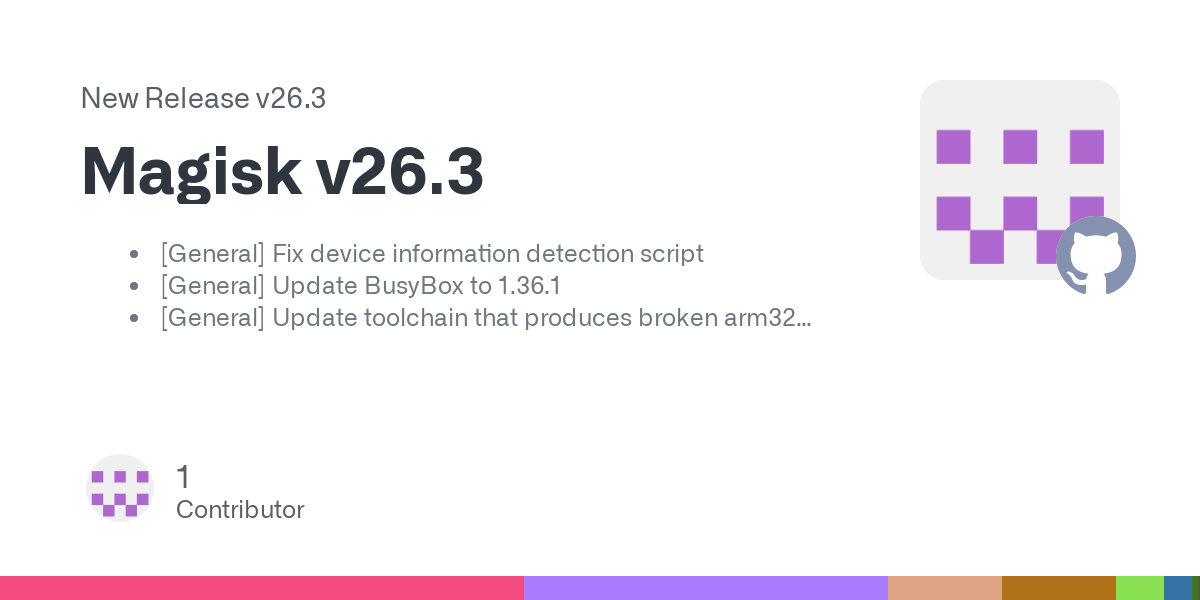- 1 Post
- 2 Comments
Joined 2Y ago
Cake day: Jul 08, 2023
You are not logged in. If you use a Fediverse account that is able to follow users, you can follow this user.
- @[email protected] to
 English
English - •
- github.com
- •
- 1Y
- •
cross-posted from: https://lemmy.zip/post/2332354
> v26.3
>
> [General] Fix device information detection script
> [General] Update BusyBox to 1.36.1
> [General] Update toolchain that produces broken arm32 executables
> [App] Fix root service unable to bind on OnePlus devices
>
> v26.2
>
> [MagiskBoot] Support extracting boot image from payload.bin
> [MagiskBoot] Support cpio files containing character files
> [MagiskBoot] Support listing cpio content
> [MagiskBoot] Directly handle AVB 1.0 signing and verification without going through Java implementation
> [Daemon] Make daemon socket a fixed path in MAGISKTMP
> [resetprop] Support printing property context
> [resetprop] Support only printing persistent properties from storage
> [resetprop] Properly support setting persistent properties bypassing property_service
> [MagiskSU] Support -g and -G options
> [MagiskSU] Support switching mount namespace to PID with -t
> [MagiskPolicy] Fix patching extended permissions
> [MagiskPolicy] Support more syntax for extended permissions
> [MagiskPolicy] Support printing out the loaded sepolicy rules
> [App] Support patching boot image from ROM zips
> [App] Properly preserve boot.img when patching Samsung firmware with init_boot.img


iOS is too restrictive for me. Not being able to access the file system, no sideloading, no background apps, limited app access to the hardware, etc. Apple has the best mobile SoCs, but then you can’t even run an app like Syncthing to keep some folders in sync (it can’t even access those folders) or use some app to re-encode a video in the background.
I like the UI consistency between apps and OS (Android is a bit more “messy”) but overall it’s a bit like ChromeOS. Good for basic stuff and sometimes the best for specific tasks, but try to do anything more advanced and you’ll quickly find a wall.
On my phone I have apps like Syncthing running in the background. Sometimes I run an app that gives me detailed info about battery usage, track/map the signal of mobile networks, contribute to Mozilla Location Service, can see to which bands my phone is connected to (and if rooted, even control which are used). If an app needs to use bluetooth to send a file or NFC, it can. On the other hand, Android still struggles to do fast file transfer well (at least it never works as well as Airdrop for me)… there are trade-offs.
Again, it’s a bit like ChromeOS/Chromebook vs Linux/Windows/macOS. Perfect for my parents, but not enough for me.
The hardware is fine. Things like the display (Samsung), modem (Qualcomm), cameras (Sony) can be found on Android devices (or at least similar hardware). Their SoC is the best there is, but then is restricted by software… a bit like buying a Ferrari to drive it in a city. Imagine a “gaming phone” with the latest A16?
Regarding software updates, Google and Samsung (at least on the more expensive devices) now have 5 years of software updates. Not as good, but not a problem for those buying a new phone today. Some brands are still bad though.